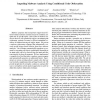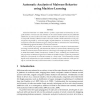15 search results - page 1 / 3 » Impeding Malware Analysis Using Conditional Code Obfuscation |
132
click to vote
NDSS
2008
IEEE
15 years 8 months ago
2008
IEEE
Malware programs that incorporate trigger-based behavior initiate malicious activities based on conditions satisfied only by specific inputs. State-of-the-art malware analyzers ...
196
click to vote
ESORICS
2011
Springer
14 years 2 months ago
2011
Springer
Abstract. Trigger-based code (malicious in many cases, but not necessarily) only executes when specific inputs are received. Symbolic execution has been one of the most powerful t...
135
click to vote
JCS
2011
14 years 5 months ago
2011
Malicious software—so called malware—poses a major threat to the security of computer systems. The amount and diversity of its variants render classic security defenses ineffe...
146
click to vote
SP
2009
IEEE
15 years 9 months ago
2009
IEEE
Malware authors have recently begun using emulation technology to obfuscate their code. They convert native malware binaries into bytecode programs written in a randomly generated...
112
click to vote
VIROLOGY
2008
15 years 2 months ago
2008
Several malware analysis techniques suppose that the disassembled code of a piece of malware is available, which is however not always possible. This paper proposes a flexible and ...


